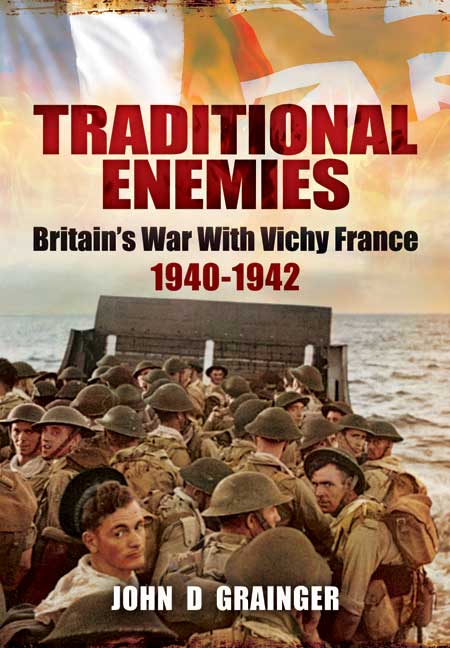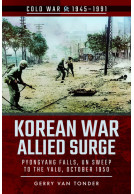Traditional Enemies: Britain's War With Vichy France 1940-42 (ePub)
File Size: 972.3 KB (.epub)
Pages: 204
ISBN: 9781783830794
Published: 8th January 2013
| Other formats available - Buy the Hardback and get the eBook for free! | Price |
|---|---|
| Traditional Enemies: Britain's… Hardback Add to Basket | £19.99 |
After the surrender of the French government in May 1940, the British were concerned that the resources of the French Empire, and particularly the powerful French fleet, would be put at the disposal of the Germans. The British, dependent upon their naval power and the resources of the Empire and Commonwealth to continue the war, sought to neutralize the threat of the French fleet and saw an opportunity to gobble up certain French colonies for themselves. Thus, even while Britain was locked in a deadly struggle with Nazi Germany, she continued the centuries-old imperial rivalry with her nearest neighbour and recent allies.
The British attack on the French Mediterranean fleet at Mers el Kebir is well known, but less often remembered are the British operations against Vichy forces in West Africa, Syria and Madagascar. As the latent threat of the French fleet was the chief source of British concern, the conflict was largely a naval one, but there were substantial land operations in Syria and Madagascar. In Syria and Lebanon, Operation Exporter pitted 20,000 British, Indian, Australian and Free French troops against 35,000 Vichy French who fought with much greater skill and determination than expected. Operation Ironclad, the invasion of of Madagascar, saw three brigades of infantry, supported by light tanks, make the first large scale British amphibious assault since the ill-fated Gallipoli landings in WWI.
John D Grainger narrates and analyses all the British operations, by land, sea and air, against the French up to the Anglo-American Torch landings in North Africa. He reveals the initial reluctance of the British forces to really get stuck into their erstwhile allies and the reverses that resulted from underestimating the will of the Vichy French to fight. The complicating factor of De Gaulle's Free French is another major theme. Above all, what emerges is that these are fascinating campaigns in their own right that have been unduly neglected.
As featured in
Isle of Thanet Gazette
I had the pleasure of reviewing this book. It's one of the most interesting I’ve read to date which sits and makes you think about what would have happened had things gone down differently. It gives the story of the French during Dunkirk and after Dunkirk and about how France was split by Germany. One half ruled by Germany the other by the Vichy government.
Argunners Magazine
The author goes into detail about the feelings and the actions with regards to Dunkirk and also the French, holding territories in Africa and the middle east. It gives detail of the French navy and its movements, the feelings by British commanders firing on French ships and also attacks on the French colonies themselves. It tells us who swore allegiance to the free French and also Vichy French and gives details of the relationship between Vichy and Germany.
It is a highly interesting read and one that would make us think what would have happened if the Germans had seized the Vichy navy.
This is an interesting book that fills a gap in the literature of the Second World War, bringing together a series of battles that are normally looked at in isolation or as a part of different topics.
History of War
I had the pleasure of reviewing this book. one of the most interesting I’ve read to date which sits and makes you think about what would have happened had things gone down differently. it gives the story of the French during Dunkirk and after Dunkirk about how France was split by Germany. one half ruled by Germany the other by the Vichy government.
WW2 Talk
the author has went into detail about the feelings and the actions with regards to Dunkirk and also the French held territories in Africa and the middle east. it gives details of the French navy and its movements, the feelings by British commanders firing on French ships and also attacks on the French colonies themselves. it tells us who swore allegiance to the free French and also Vichy French. it gives details of the relationship between Vichy and Germany
this book is a highly interesting read all be it alot of politics it is a highly interesting read and one that would make us think what would have happened if the Germans had seized the Vichy navy
John D Grainger narrates and analyses all the British operations, by land, sea and air, against the French and up to the Anglo-American Torch landings in North Africa. He reveals the initial reluctance of the British forces to really get stuck into their erstwhile allies and the reveres that resulted from underestimated the will of the Vichy French fight. The complicating factors of De Gaulle’s Free French is another major theme. Above all, what emerges is that these are fascinating campaigns in their own right that have been unduly neglected.
Books Monthly
In May and June 1940, as the Germans battled their way through France, the British and French were fighting shoulder to shoulder in an attempted of half the enemy. One month later, in July, the Royal Navy turned its big guns on the French and killed around 1,300 of them. This remarkable change in fortunes is described in detail in a new book, Traditional Enemies that explains why and how Britain waged war against Vichy France during the years of 1940-42.
Folkestone Herald & Dover Express














